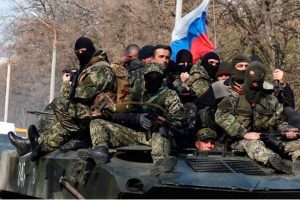Atamanshchina is spreading through Moscow hybrid forces in the Donbas, Beness Aijo, a pro-Moscow mercenary has warned. And because this phenomenon not only is leading to the decay of these forces but also alienating the population from them, he has appealed for “complete uprooting” this dangerous trend.
The term “atamanshchina,” as American historian Canfield F. Smith has pointed out, “connotes in one word” in Russian what it takes several words in other languages to describe” (Canfield F. Smith, “Atmanshchina in the Russian Far East,” Russian History/Histoire Russe, 6:1 (1979): 57).
In general, Smith writes, the suffix “-shchina
” “means ‘the evil deeds of’ the name that precedes it,” thus, the Pugachevshchina for the peasant revolt against Catherine the Great and the Yezhovshchina for the bloodiest period of Stalin’s repression in the 1930s. But its most frequent application has been to the partisan leaders on both sides in the Russian civil war, 1917-1922.
Many of the “atamans” at that time were little more than brigands who maintained their power by brutal means, had little attachment to any ideology – many of them changed sides – and by their actions drove the population over which they aspired to rule into the hands of whatever side they were not on at any particular time.

Consequently, for a pro-Moscow participant in the Donbas fighting to speak about the emergence of such a phenomenon there now underscores the extent to which the pro-Moscow forces have deteriorated into little more than criminal bands and to which some in these forces fear they are alienating the population beyond any hope of recovery.
In an article on the IAREX.ru portal entitled “Makhnovshchina in Action” – the Makhno in this word is a reference to Nestor Makhno
, one of the more notorious atamans in Ukraine during the Russian civil war – Beness argues that “unfortunately in certain units of the L/DNR” there are actions which recall those of Makhno.
His 2500-word article documents numerous examples of the brigandage such forces are now engaging in and warns that if this continues, pro-Moscow forces will suffer a double loss, the first causing the collapse of military discipline and the second resulting in the alienation of the population from them.
Beness, it should be noted, has an interesting biography. Born in Latvia in 1979 to an Ugandan father and a Russian mother, he's been part of many pro-communist and pro-Moscow activities in Latvia and the UK over the years. He attracted attention by organizing a demonstration against the Riga visit of US President George W. Bush. He participated in Putin's anschluss of Crimea from Ukraine in 2014 and is currently a mercenary in the Russian hybrid military forces in the Donbas.
Related:
- Russian military analyst: The forces in Donbas are Russian Army
- Ukrainian military intelligence identifies top Putin’s generals conducting war in Ukraine
- One fifth of Russia’s hybrid “DNR/LNR” force in Ukraine are regular Russian Army troops — Ukrainian MoD (Infographics)
- Donbas militias are “UNITS OF THE RUSSIAN ARMY,” says Babchenko
- New “old” Russian imperialism and hybrid wars — an historical overview
- Kremlin hybrid war tactics in Georgia, 2008 and Ukraine, 2014-2015 (Infographic)
- Russian hybrid warfare: what are effects-based network operations and how to counteract them
- Hybrid war “a Russian strategy since Mongol times,” blogger says

